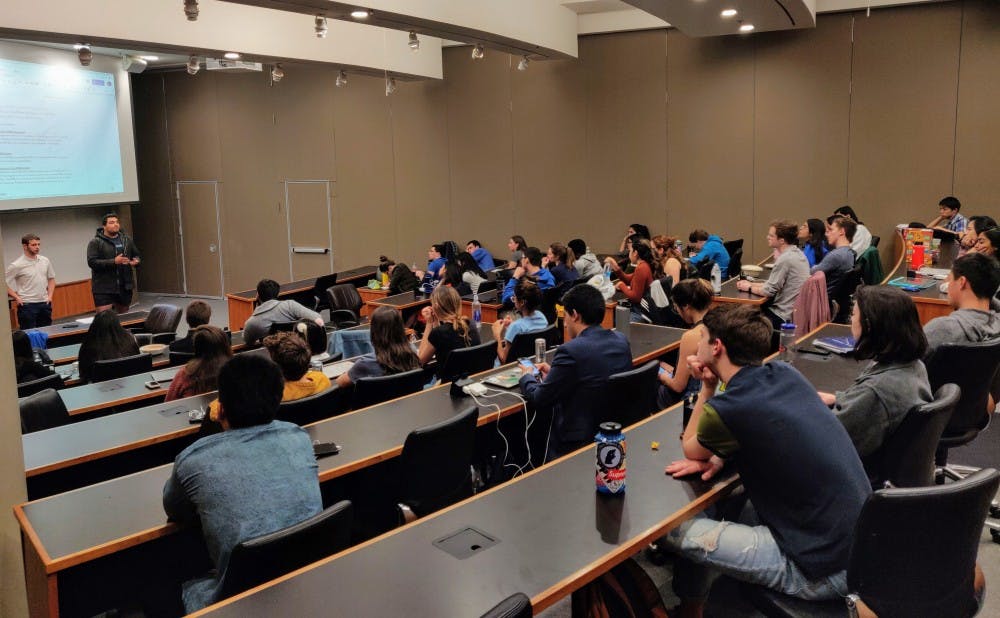The Duke Student Government Research Unit's work presented at DSG's Wednesday meeting suggested some students may not fully understand aspects of advising, academic resources and sexual assault reporting.
The Research Unit investigates questions “commissioned to them by [the] DSG Senate, culminating with a report at the end of the project,” according to its Facebook page. On Wednesday, three teams delivered presentations on the results of student surveys and meetings with administrators on three topics—academic advising, the Academic Resource Center and sexual assault prevention.
First-year Maya Choudhury and junior Dylan Powers reviewed the Academic Advising Center. They reported many students are confused about how the advising system at Duke works.
“Sometimes when students go to [the Academic Advising Center] website, they don’t know where to look for certain resources,” Powers said.
He noted that first-years are often particularly confused, as they do not know the difference between different types of advisors.
The pair presented several suggestions for improving clarity in advising, including updating the AAC’s website with more information and publicizing the services offered by Directors of Academic Engagement and major-specific Directors of Undergraduate Studies.
First-year Daniel Winkelman, junior Shyam Pradheep and sophomore Katie Orlin conducted research on the Academic Resource Center. They noted that, as with the case of AAC, many students are not aware of the services ARC offers.
“The ARC is effective,” Pradheep said, “it’s just that more people need to know about it.”
The group reported that the Science Advancement through Group Engagement program is among the most effective resources that the ARC offers but it is not well known. The SAGE program is invitation-only and consists of study groups of between four and six “highly motivated” students, according to the ARC’s website.
First-year Sid Madala, senior Celia Macrae, sophomores Cole Zaharris and Josh Coopersmith and junior Jesse Doppelt gave a report on sexual assault prevention on Duke’s campus, ringing the gong of student confusion a third time.
“Students do not have a clear understanding of the services that each support organization provides and which organizations are mandatory reporters,” according to the group’s presentation.
Almost half of students surveyed thought that Counseling and Psychological Services and the Women’s Center are required to report sexual assaults to the Office of Student Conduct under Title IX. In reality, they are not required to, but resident assistants are. Nearly 90 percent of students correctly identified that RAs are mandatory reporters.
Senate passes its annual budget
The Senate approved a final Student Organization Finance Committee budget for the 2019-20 academic year.
The budget includes around $305,000 in funding for student organizations, according to senior and SOFC Chair Ben Hubsch. This number grows to around $400,000 when sports clubs are included.
The last two meetings saw hours of debate on the budget, but this week’s discussion was much quicker. After tweaking the funding for a handful of groups, the Senate passed the budget in a unanimous vote—and then burst into a round of applause.
In other business
The Senate heard the first reading of a by-law amendment that would create an Interfaith Council, a DSG affiliate body with representatives from religious groups on campus.
“This council could serve as a means for transferring information and addressing hate and bias on campus, working towards service learning stuff, promoting interfaith events on campus,” said junior Usamah Chaudhary, religious advocacy and policy adviser on the DSG Cabinet, who presented the amendment along with sophomore Sarah Jacobs.
The meeting also saw the first reading of an amendment to the Student Organization Finance Committee by-law that would create two vice-chairs for auditing. One of the chairs would focus on the annual budget and one would focus on programming funds.
“Right now [auditing of SOFC funding] happens basically on self-reporting,” said sophomore Devin Mahoney, current vice chair of new groups who will serve as SOFC Chair next year. "Which ultimately leads, as I’ve realized, to a lot of groups having a ton of money left over that doesn’t get spent.”
Mahoney gave an example of a random SOFC audit that revealed that the group that put on an event had around $4,000 in unspent funding in their account. She added that groups often aren’t aware that they have unspent money because they do not have access to their account balance.
The Senate approved $1,597.06 in SOFC funding for Duke University Improv’s “Big Show.”
The chamber also approved the charter of the Duke Private Equity Club, which helps prepare students for private equity recruiting by providing them “a broad understanding and specialized focus of buy-side opportunities,” according to the group’s charter. The group plans to change its name to the “Duke Private Equity Interest and Education Club” to avoid confusion, as it does not itself engage in private equity investment.
Get The Chronicle straight to your inbox
Signup for our weekly newsletter. Cancel at any time.
Matthew Griffin was editor-in-chief of The Chronicle's 116th volume.

